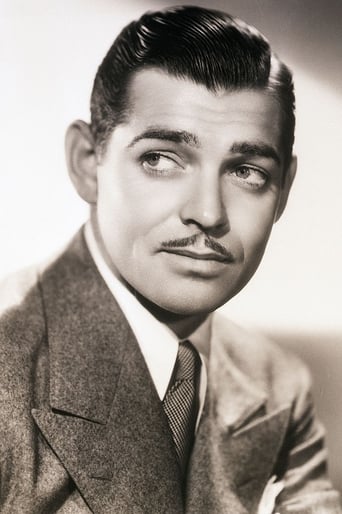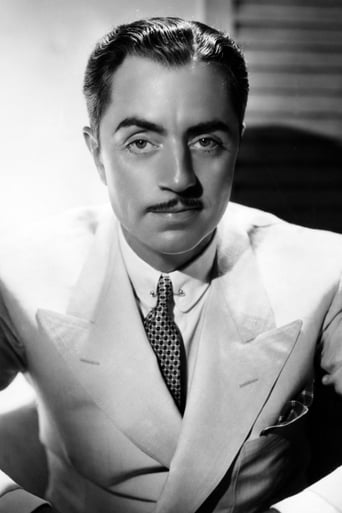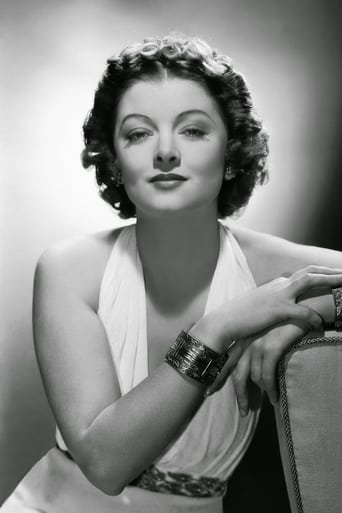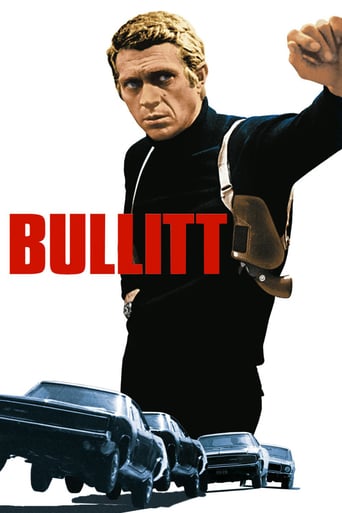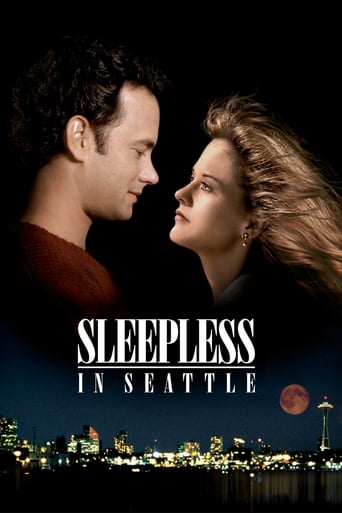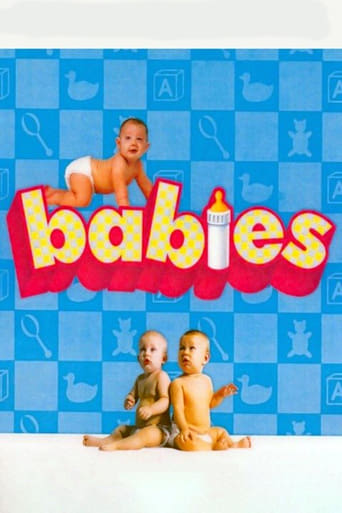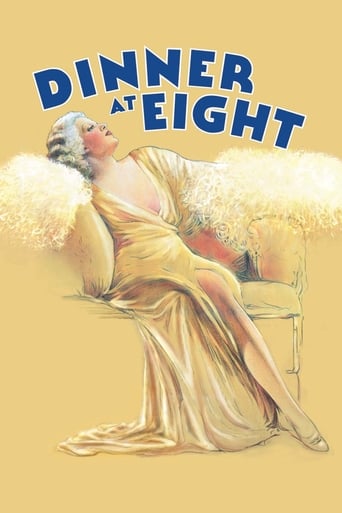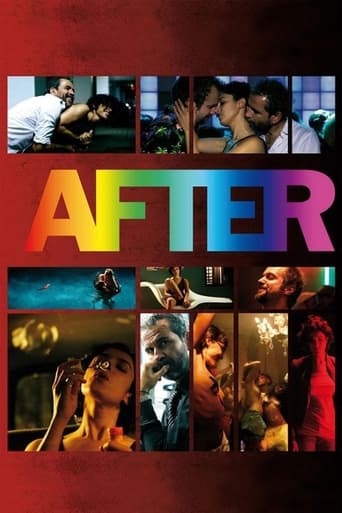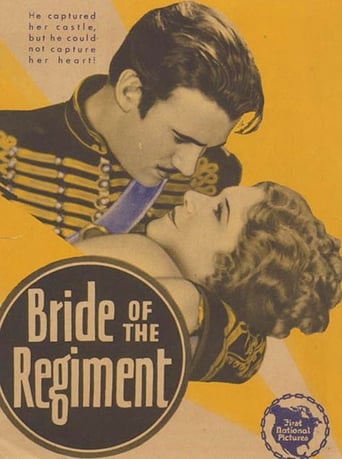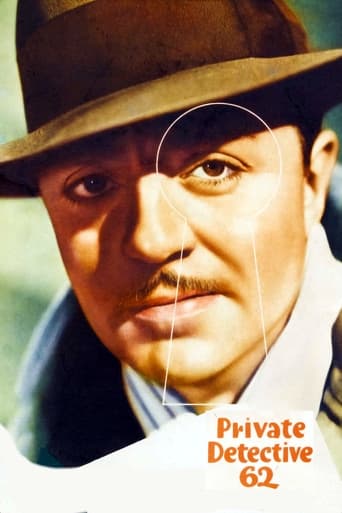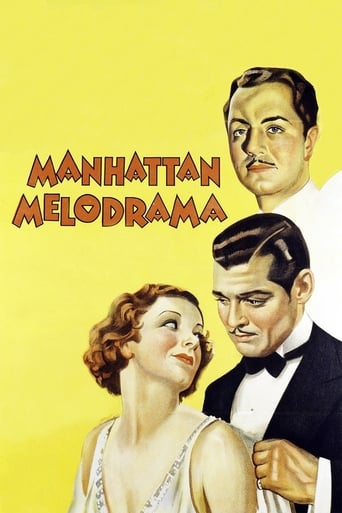

Manhattan Melodrama (1934)
The friendship between two orphans endures even though they grow up on opposite sides of the law and fall in love with the same woman.
Watch Trailer
Cast
Similar titles
Reviews
I cannot think of one single thing that I would change about this film. The acting is incomparable, the directing deft, and the writing poignantly brilliant.
I wanted to like it more than I actually did... But much of the humor totally escaped me and I walked out only mildly impressed.
The story, direction, characters, and writing/dialogue is akin to taking a tranquilizer shot to the neck, but everything else was so well done.
By the time the dramatic fireworks start popping off, each one feels earned.
OUTSTANDING FILM FARE from beginning to end, MANHATAN MELODRSMA represents the very zenith of the motion picture of its day. The mounting, the sets, the large cast and the story line all mesh very well into a collectively made work of art.AS SWE HAVE alluded to in the summary, this is chock full of what we may consider as being clichéd situations and plot twists. In that sense, it also may well be highly predictable. This is only true because it was introducing story lines that would be fed through the Hollywood Xerox machines for the next 20 years or so. After all, nothing succeeds like success and those in Tinsel Town never minded copying, borrowing or stealing from one another. In this manner, many types or genres were established.THE STORY SHOWCASES big city life among the working poor, the "blue collar" folks, the polyglot of ethnicities that were blended into what we know as Americans Growing up is demonstrated in two diverging paths, one straight the other the criminal. As is the case all too often n real life, the two paths may well move in very different directions; yet they begin perilously close together. IN ADDITION TOM the outstanding cast of Mr. Gable, Mr. Powell and Miss Loy, the bolstering of their performances by a large and very capable supporting cast and the previously mentioned origination of the genre, the polish that is evident is largely due to its being directed by W.S. Van Dyke. THE FILM HAS also had an everlasting mystique shrouding it because of the event of July 22, 1931. It seems that notorious bank robber, John Dillinger, wanted to see it very badly and went to see it with two others in Chicago that night at the Biograph Theatre. It was following the showing that Dillinger met his maker in a shoot out with the FBI and local Chicago cops. Because of this, the Biograph, with its "Cooled by Refrigeration" sign, remains open today as a tourist attraction on north Lincoln Avenue.WE WONDER JUST what sort of review Mr. Dillinger would have given the movie ?
A very aptly named film, this is a fairly entertaining, if overblown, tale. The script, written by Oliver H.P. Garrett and Joseph L. Mankiewicz based on a story by Arthur Caesar, tells the familiar story of two childhood friends, one of whom grows up to be a respectable citizen who attains high political office (two things which are often mutually exclusive in real life) and one of whom grows up to be a career criminal. Admittedly, it was far less familiar in 1934 than it is today. The film is rather well directed by W.S. Van Dyke but it's not on the same level as in the "Thin Man" films. The film earned a special place in history as, after John Dillinger attended a screening of it in Chicago on July 22, 1934, he was gunned down by the FBI.The film stars Clark Gable and William Powell as the gangster and illegal casino owner Edward J. "Blackie" Gallagher and William Powell as the Manhattan District Attorney turned Governor of New York James W. "Jim" Wade respectively. Oddly enough, Powell was Carole Lombard's first husband while Gable later became her second. Both performances are good but neither is on the same level as their best work. Having been orphaned in the General Slocum disaster on June 15, 1904, Jim took the younger Blackie under his wing and attempted to keep him on the straight and narrow. Needless to say, his efforts did not meet with much success. In spite of the fact that he commits murder to ensure Jim's election to the governorship, Blackie is a rather likable character. His eternal loyalty to Jim is quite touching. It does not really ring true but then again I don't think that the developments in any film which actually includes the word "melodrama" in the title are intended to be realistic! A bigger problem is that said developments are not executed as entertainingly as they could have been.Myrna Loy is strong as Eleanor Parker, who starts off as Blackie's girlfriend but later starts a relationship with Jim and eventually marries him. If I were her, I'd have probably made the same choice. At the risk of repeating myself, Loy was likewise better in other films. While she and Gable do not have much in the way of chemistry, her more light-hearted early scenes with Powell are electrifying. This was their first of 14 films together over the course of the next 13 years, most notably in the "Thin Man" film series. They worked so well together that many people though that they were married in real life. Nat Pendleton, another "Thin Man" alumnus, provides much of the comic relief as Blackie's dimwitted henchman Spud while the 14-year-old Mickey Rooney makes an early appearance as the young Blackie.Overall, this is quite a fun film. I hope Dillinger enjoyed it, though it certainly isn't worth dying for. He probably did not have the time to appreciate the irony of the last film that he watched involving the death of a famous gangster, what with the bullets flying around him and all. It's the sort of thing that I would find far-fetched if it happened in fiction, frankly.
The first is a smart, sophisticated, snappy romp with Cable, Loy and Powell lighting up the screen. Hell, turn off the sound and just watch the light. Then turn it back on to catch the dialog that matches it. Better than Mr. Lucky and that's saying a lot.Second movie is the courtroom/prison drama that plays a lot like Production Code Censoring. Mankiewicz manages to make it believable and even establish, or at least presage, standard Death Row bravado - which Gable is able to pull off with panache. Even so, the introduction, or imposition, of all of the stock elements of code morality, no matter how gamely handled by writer and cast, was not a plus.Saw Manhattan Melodrama first time as a kid and was mightily impressed. Even with the second part (though slightly confused by the sudden change in tone). It played for me then as individuals taking responsibility for their actions.Just saw it again on TMC and was struck by how well it aged. But the murder and the courtroom/prison drama didn't play anywhere closely as well as I remembered: it reeked of Code dictated morality that almost ruined my memory of it.Almost but not quite. Except for Powell's resignation speech that ends Manhattan (which should have fallen to the cutting-room floor), Cable, Loy and Powell save it in the best tradition of flawed, improbable endings that Hollywood is so eminently well-know for.If the conflict between friendship and duty had been allowed to play out more in tone with the first part, more naturally and with a touch of realism, who knows? Critics and public alike might still remember it as a Classic.Bottom line, despite the flaws of the second part, still one of the '30s must see, A-list films.
From what I can gather, two main social factors led to the popularity of the gangster genre in the 1930s. The first, and most obvious, was the prevalence of criminals like Al Capone and John Dillinger, who were glorified by the national media. The second was the Great Depression, and how it impacted the traditional notion of the "American dream." Families – regardless of character or social standing – were torn apart amid the economic collapse, and no doubt many ordinary citizens contemplated crime as the route to happiness.Films like 'Manhattan Melodrama (1934)' and 'Angels with Dirty Faces (1938)' place great emphasis on the thin line between "good" and "bad" characters, and often the central criminals are lamented as victims of circumstance. For example, James Cagney's Rocky Sullivan and Pat O'Brien's virtuous priest were separated by a matter of metres when the former is condemned to a life of crime. Circumstance, too, drives the fates of the characters in 'Manhattan Melodrama.' As children, both Jim Wade (William Powell) and Blackie Gallagher (Clark Gable) lose their parents in the burning of the steamship SS General Slocum, a true-life disaster caused by gross negligence that cost over 1000 lives. Each child responds to this injustice in their own way: Blackie rebels against the judicial system that betrayed him, whereas Jim enters law in a bid to reform it.Whereas Warner Bros. was responsible for most of the decade's gangster films, 'Manhattan Melodrama' was produced by M-G-M, and helmed by W.S. Van Dyke (director of the first four 'Thin Man' films), whose decidedly non-gritty aesthetic style at first seems at odds with the required mood. However, it would be misleading to compare the film with the likes of 'Little Caesar (1931)' and 'Scarface (1932).' Firstly, Hollywood was now working, for the first time, under the active supervision of the Production Code Administration. Also, the studio's intentions for the film were undoubtedly geared towards a higher-brow audience, further suggested by the unintimidating, woman-friendly title.Gable's "Blackie" Gallagher is not a paranoid hot-head like Tony Camonte or Rocky Sullivan, and, indeed, remains oddly passive throughout the film. When he does commit murders, it seems to be merely out of an obligation to genre conventions. Even when old friend Jim Wade dramatically demands his execution, Blackie looks on with a detached, amused smirk, doodling idly from the defendant's chair; the expected outburst of emotion never arrives. Instead, the story's central conflict unfolds entirely within the righteous Wade, who must choose between his personal and professional allegiances.'Manhattan Melodrama' has achieved some notoriety for being the film that killed John Dillinger, so to speak. The fugitive bank-robber was gunned down by FBI agents as he emerged from a screening at Chicago's Biograph Theatre on July 22, 1934 (clips from the film were recently featured in Michael Mann's 'Public Enemies (2009)'). These curious circumstances can't help but make one ponder what Dillinger had thought of 'Manhattan Melodrama.' Had he, like Blackie, accepted that his time was coming to an end? Did he welcome death over a lifetime of legal persecution? At the very least, he checked out having experienced a very fine addition to the genre.
